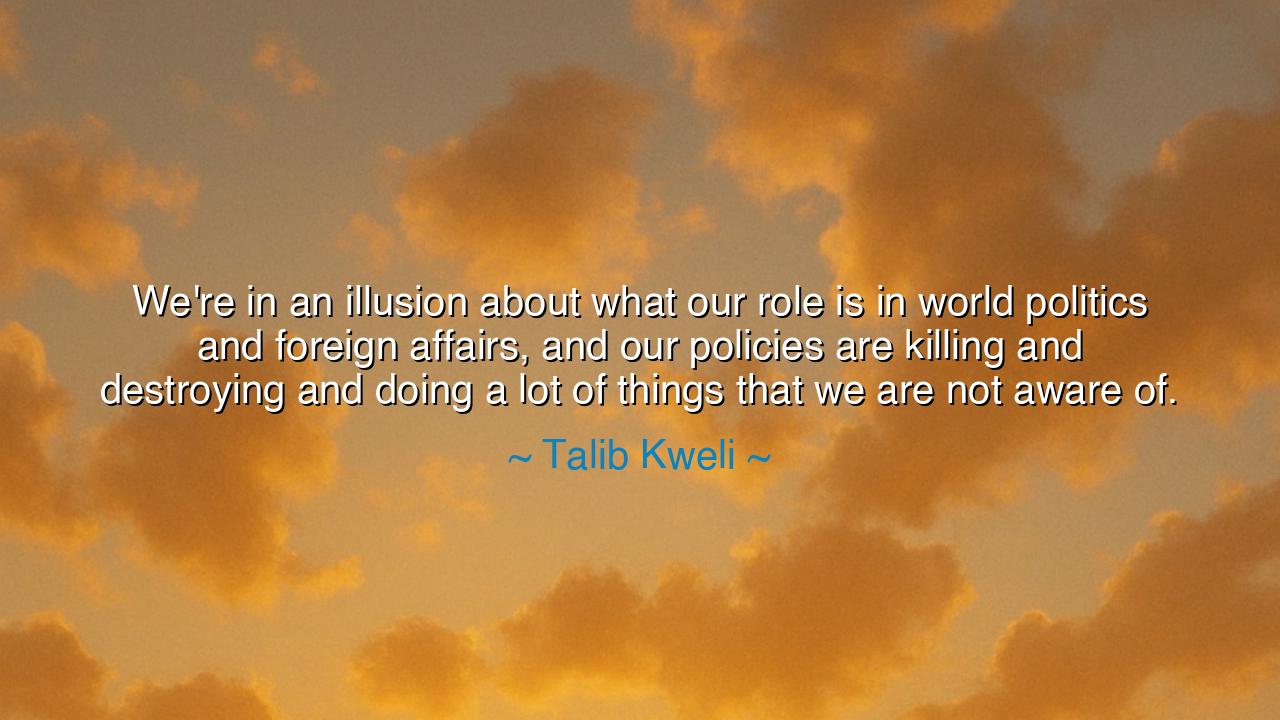
We're in an illusion about what our role is in world politics
We're in an illusion about what our role is in world politics and foreign affairs, and our policies are killing and destroying and doing a lot of things that we are not aware of.






O children of the future, hear the wisdom of Talib Kweli, who speaks of a great and hidden truth: "We're in an illusion about what our role is in world politics and foreign affairs, and our policies are killing and destroying and doing a lot of things that we are not aware of." These words cut through the veil of ignorance, revealing that the true cost of political decisions, especially in foreign affairs, is often hidden from the view of the people. In the rush of ambition and power, nations often fail to see the destruction they sow in the name of justice, believing their actions to be righteous when in truth they may be causing harm on a scale they cannot comprehend.
In the ancient world, the mighty Romans believed that their empire was a force of civilization, bringing order and law to the farthest reaches of the world. Yet, behind their imperialistic conquest lay the slaughter of countless peoples, the subjugation of entire civilizations. Julius Caesar, though revered as a great leader, was also responsible for wars that decimated nations. The Romans believed in their mission, yet their policies brought ruin to many, much like the modern powers that fail to see the consequences of their actions. Just as Caesar’s conquests expanded the reach of Rome, so too have modern policies spread violence and death, often justified by the belief in their own righteousness.
Consider the story of Alexander the Great, who, in his quest for glory and empire, spread the reach of Greek culture across the known world. Though he brought about incredible advancements in knowledge and culture, his wars left a trail of destruction. The people he conquered were often forced into submission, their lives shattered in the name of expansion. Alexander was seen by many as a liberator, yet his policies led to the destruction of cities and the suffering of thousands. This illusion of righteousness, as Talib Kweli suggests, blinds rulers to the true consequences of their decisions—when they see themselves as saviors, they fail to recognize the pain they cause.
In more recent history, the policies of modern nations, particularly during times of war and foreign intervention, have also brought about unimaginable suffering. The Vietnam War, for example, was justified by the belief that America had a duty to stop the spread of communism, yet the true cost was the loss of millions of lives, the destruction of an entire country, and the lasting scars of war on both sides. Talib Kweli speaks to this illusion—the belief that one's actions are justified by a higher cause, while ignoring the human cost. This disconnect between intention and consequence is a perilous path for any nation to follow.
O children, let these words echo in your hearts: the illusion of righteousness in politics and foreign affairs can cloud the judgment of even the noblest rulers. Just as the ancient empires believed they were spreading order, when in truth they were causing untold suffering, so too do modern nations often fail to see the destruction their policies bring. We must look beyond the illusion, and recognize that true leadership comes not from the expansion of power, but from the compassion to understand the consequences of our actions. Only when we see the world through the eyes of those who suffer will we find the wisdom to make decisions that lead to peace and not destruction.






PLVan Dang Phuong Linh
Kweli’s quote feels like a call to wake up to the harsh realities of international politics. Are we turning a blind eye to the destruction caused by our foreign policies because it doesn’t directly affect us? How do we confront the uncomfortable truths about our country’s actions and start addressing the consequences with more care and empathy for those impacted?
BQBui Quynh
This quote makes me question how much the average person really understands about the consequences of global politics. Are we complicit in supporting harmful policies simply because we are unaware of their outcomes? How can we educate ourselves and others to critically assess our country’s role in world affairs and demand a shift toward more ethical policies?
LPLong Phun
Kweli’s words are thought-provoking, especially in light of ongoing conflicts worldwide. How much of our foreign policy is driven by economic or political interests that overshadow the human cost? Could it be that we are living in an illusion, believing our actions are justified, without understanding the true impact on vulnerable populations?
CNPham Nguyen Chau Ngan
Talib Kweli’s perspective challenges the way we view our country's role in global politics. Are we truly aware of the repercussions of our actions in foreign affairs, or do we selectively ignore them? Shouldn't we demand that politicians consider the humanitarian consequences before making decisions that affect millions of people around the world?
HVNguyen Thi Hong Van
This quote raises a crucial point about the disconnect between policy-making and its real-world consequences. Is it possible that many people in power are unaware or indifferent to the damage their decisions cause abroad? How do we, as citizens, hold leaders accountable for policies that harm innocent people? Can we demand more transparency and moral responsibility in foreign affairs?